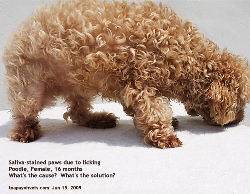 TOA
PAYOH VETS TOA
PAYOH VETS
toapayohvets.com
Date:
15 June, 2009
|
|
Focus: Small
animals - dogs, cats, hamsters, guinea pig & rabbits. |
|
|
|
|
SURGERY HOURS:
|
*10 a.m - 5 p.m (Mon - Sun,
except Sat). Dr Sing Kong Yuen. By Appointment Only.
*6 p.m - 10 p.m (Mon - Fri). 10am - 5pm (Sat). Dr
Jason Teo. House-calls available.
Appointment preferred.
Tel: 6254-3326, 9668-6469 |
EMERGENCY
11 p.m to 6 a.m
Dr Teo
Tel: 9853-1315,
9668-6469, 6254-3326 |
judy@toapayohvets.com
Fax: +65 6256 0501 |
|
|
|
Toa Payoh Vets Clinical
Research
Making veterinary surgery alive
to a veterinary student studying in Australia
using real case studies and pictures |
|
Paw Licking in A Young Dog in
Singapore
Dr Sing
Kong Yuen, BVMS (Glasgow), MRCVS
Case written:
15 June, 2009
|
Toy Poodle, Female, DOB Feb 25, 2008.
lst heat Sep 2008, 2nd heat Apr
2009 (Heat starts at around
7-monthly intervals).
Consultation at Toa Payoh Vets: Jun
14, 2009. Yearly Vaccination and Check
Up.
My Observation: I noted that all 4
paws are dark red due to excessive
licking of the paws.
Problem: Continually licking
4 paws daily for the past weeks.
Sometimes it is hard to know the
cause. In this case, I suspect this
case is due to dampness from
daily washing of the feet with the dog
shampoo after her daily exercise. The
owner uses a piece of cloth to dry the
paws after washing. However, residual
dampness cause itchiness. The young
dog licks the paws to relieve her
itch. Continual licking leads to more
itchiness and saliva-stained darker
hairs on the paws. Here is one
suggestion from me:
 Management: Management:
Owner: Young lady in her 20s
HDB apartment
Elimination:
Newspapers on pee pan usually. Sometimes
floor mat.
Feeding and water usual
Goes downstairs daily for exercise.
Wash feet, dry with a piece of cloth.
Suggestions:
1. Clip off all paw hairs including
underside, up to carpal/tarsal area.
2. Don't wash paws daily. Leave it
dry.
3. Buy booties for daily outing.
4. Bathe once a week. Avoid shampoo on
paws.
5.
Consult your vet.
Medication includes antibiotics,
anti-fungal, anti-fungal wash.
6. Anti-fungal wash dip 3x/week for 2
weeks. Then 2x/week for remaining part
of 2 months. Rinse paws thoroughly
with plain water inside a cup. Keep
paws dry after washing and by use of
booties when going outdoors.
7. Review by telephone in 2 months.
Conclusion:
This case has a high chance of success
if the owner keeps the paws dry and
clean.
It is unlikely that the owner will
provide feedback. However, dampness
and continual licking is a vicious
cycle leading to hyperpigmented thick
paw skin in later years. Therefore,
early treatment and prevention of paw
dermatitis when the dog is young is
very important. How to do it? Much
depends on the owner to know how to
keep the paws dry and clean at all
times in the young dog. |
|
 Toa Payoh Vets Toa Payoh Vets
Clinical
Research |
|
|
Copyright ©
Asiahomes Internet
All rights reserved. Revised: June 15, 2009
Toa
Payoh Vets
|
 TOA
PAYOH VETS
TOA
PAYOH VETS TOA
PAYOH VETS
TOA
PAYOH VETS